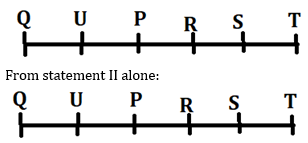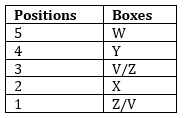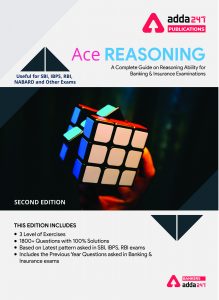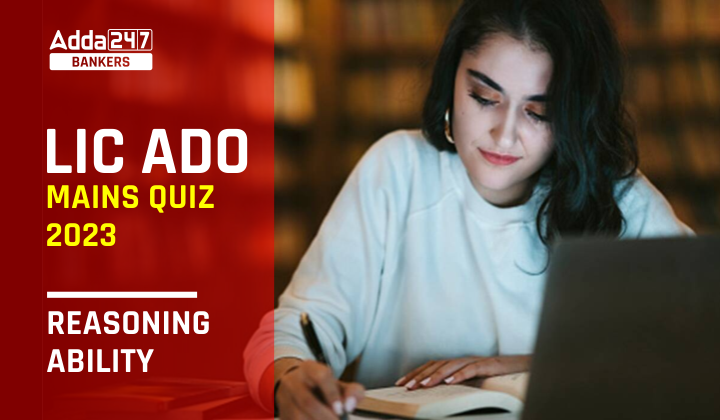Directions (1-5): Read the following arrangements of five-digits numbers carefully and answer the questions based on it. (Note: Consider the 1st, 2nd, 3rd, 4th and 5th digit of the number from the left side).
98766 84921 36728 43512 79632
Q1. If we arrange all the digits of the numbers in the ascending order within the number from the left end, then what will be the resultant sum of 5th digit of all the numbers after the rearrangement?
(a) 36
(b) 40
(c) 42
(d) 38
(e) None of these
Q2. If we arrange all the digits of the numbers in the ascending order within the number from the left end, then what will be the resultant product of the 3rd digit of first three numbers from the right end after the rearrangement?
(a) 106
(b) 108
(c) 112
(d) 144
(e) None of these
Q3. If one is subtracted from all the even digits of all the numbers then which number will be divisible by three after the rearrangement?
(a) 84921
(b) 36728
(c) Both (a) and (d)
(d) 98766
(e) 79632
Q4. If we interchange the first digit with fifth digit and second digit with fourth digit within the number then, how many numbers will be even numbers?
(a) One
(b) Two
(c) Three
(d) Four
(e) None of these
Q5. If one is subtracted from all the odd digits of all the numbers then which number will be second highest number after the rearrangement?
(a) 98766
(b) 84921
(c) 36728
(d) 43512
(e) 79632
Direction (6-10): Answer the following questions based on the arrangement given below.
J 7 K + E 8 # L Z @ M 3 $ P 4 2 C H & % Y 0 / 1 W < V U
Step I: The letters which are followed by a symbol but not preceded by a letter are arranged just before J in the reverse alphabetical series.
Step II: The symbols which are preceded by numbers are arranged such that the first symbol is arranged at the rightmost place, the second symbol to the leftmost place, the third symbol to the rightmost place and so on.
Step III: The numbers which are preceded by letters are arranged from right to left in the descending order at the end of the series.
Note: Step II is applied after step I and Step III is applied after step II.
Q6. How many such symbol(s) are there in step II which are followed and preceded by a letter?
(a) Two
(b) Three
(c) One
(d) None
(e) None of these
Q7. What is the sum of the numbers occurring between @ and < in step III?
(a) 9
(b) 5
(c) 3
(d) 1
(e) None of these
Q8. Which of the following element will be 5th to the left of 14th element from the left end in step I?
(a) M
(b) L
(c) @
(d) 8
(e) None of these
Q9. How many numbers is/are there which is/are followed by as well as preceded by a consonant in step III?
(a) Two
(b) Five
(c) One
(d) Six
(e) None of these
Q10. Which of the following pairs of elements will be there at the leftmost and rightmost places in step II?
(a) / and $
(b) / and 7
(c) K and U
(d) / and <
(e) None of these
Direction (11-15): The question given below consists of two statements numbered and II below them. You have to decide whether the data provided in the statements are sufficient to answer the question. Read all the statements and give answer:
Q11. Seven persons A, B, C, D, E, F and G are sitting along a row facing the north direction but not necessarily in the same order. How many persons sit between A and B?
Statements:
I. Three persons sits between G and A who sits at one of the ends of the row.
II. B sits third to the left of E who sits second to the right of G. Three persons sit between B and F.
(a) The data in statement I alone are sufficient to answer the question, while the data in statement II alone are not sufficient to answer the question.
(b) The data in statement II alone are sufficient to answer the question, while the data in statement I alone are not sufficient to answer the question.
(c) The data either in statement I alone or in statement II alone are sufficient to answer the question.
(d) The data given in statements I and II together are not sufficient to answer the question.
(e) The data in statements I and II together are necessary to answer the question.
Q12. Which statement is sufficient to find the code for ‘survivor’ in the given code language?
Statements:
I. ‘Pakistan war hero survivor’ is coded as ‘nr, da, hg, tp’
II. ‘War memorial battle Pakistan’ is coded as ‘nr, da, hg, gd.
(a) The data in statement I alone are sufficient to answer the question, while the data in statement II alone are not sufficient to answer the question.
(b) The data in statement II alone are sufficient to answer the question, while the data in statement I alone are not sufficient to answer the question.
(c) The data either in statement I alone or in statement II alone are sufficient to answer the question.
(d) The data given in statements I and II together are not sufficient to answer the question.
(e) The data in statements I and II together are necessary to answer the question.
Q13. Six persons P, Q, R, S, T and U sit in a row facing north direction. Who among the following sits at extreme right end?
Statements:
I. U sits third to the left of S and neither of them sit at extreme end. P sits immediate left of R. Q sits to the left of T.
II. Q sits second to the left of P who sits third to the left of T. R sits immediate left of S.
(a) The data in statement I alone are sufficient to answer the question, while the data in statement II alone are not sufficient to answer the question.
(b) The data in statement II alone are sufficient to answer the question, while the data in statement I alone are not sufficient to answer the question.
(c) The data either in statement I alone or in statement II alone are sufficient to answer the question.
(d) The data given in statements I and II together are not sufficient to answer the question.
(e) The data in statements I and II together are necessary to answer the question.
Q14. Six poles M, N, O, P, Q and R have different heights. Pole N is not the tallest. Which among the following pole is 2nd tallest?
Statements:
I. Two poles are taller than pole M. Pole P is taller than pole O and pole R but not than pole M.
II. Neither pole P nor pole O is the tallest. Pole M is shorter than pole N.
(a) The data in statement I alone are sufficient to answer the question, while the data in statement II alone are not sufficient to answer the question.
(b) The data in statement II alone are sufficient to answer the question, while the data in statement I alone are not sufficient to answer the question.
(c) The data either in statement I alone or in statement II alone are sufficient to answer the question.
(d) The data given in statements I and II together are not sufficient to answer the question.
(e) The data in statements I and II together are necessary to answer the question.
Q15. Five boxes V, W, X, Y and Z are kept one above another such that bottommost box is numbered as 1 above it as 2 and so on. Which among the following is topmost box?
Statements:
I. Box W is just above box Y. Box V is two boxes above box Z.
II. Box X is even numbered box. Only box W is above box Y.
(a) The data in statement I alone are sufficient to answer the question, while the data in statement II alone are not sufficient to answer the question.
(b) The data in statement II alone are sufficient to answer the question, while the data in statement I alone are not sufficient to answer the question.
(c) The data either in statement I alone or in statement II alone are sufficient to answer the question.
(d) The data given in statements I and II together are not sufficient to answer the question.
(e) The data in statements I and II together are necessary to answer the question.
Solutions
Solution (1-5):
S1. Ans. (b)
Sol. Given series – 98766 84921 36728 43512 79632
After operation – 66789 12489 23678 12345 23679
The sum of the 5th digit of all the numbers will be (9+9+ 8+5+9) = 40.
S2. Ans. (b)
Sol. Given series – 98766 84921 36728 43512 79632
After operation – 66789 12489 23678 12345 23679
The product of the 3rd digit of all the first three numbers from right end will be (6 x 3 x 6) = 108.
S3. Ans. (c)
Sol. Given series – 98766 84921 36728 43512 79632
After operation – 97755 73911 35717 33511 79531
Clearly 97755 and 73911 are divisible by 3. 97755 represent 98766, while 73911 represent 84921.
S4. Ans. (b)
Sol. Given series – 98766 84921 36728 43512 79632
After operation – 66789 12948 82763 21534 23697
Hence, there will be two even numbers.
S5. Ans. (b)
Sol. Given series – 98766 84921 36728 43512 79632
After operation – 88666 84820 26628 42402 68622
Hence, second highest number will be 84820 (84921).
Solution (6-10):
Sol.
Given series – J 7 K + E 8 # L Z @ M 3 $ P 4 2 C H & % Y 0 / 1 W < V U
Step I: W K J 7 + E 8 # L Z @ M 3 $ P 4 2 C H & % Y 0 / 1 < V U
Step II: / # W K J 7 E 8 L Z @ M 3 P 4 2 C H & % Y 0 1 V U + $ <
Step III: / # W K J E L Z @ M P 2 C H & % Y 1 V U + $ < 0 3 4 7 8
S6. Ans.(c)
S7. Ans.(c)
S8. Ans.(b)
S9. Ans.(a)
S10. Ans.(d)
Solution (11-15):
S11. Ans. (e)
Sol. From statement I and II together:

Hence, the data in statements I and II together are necessary to answer the question.
S12. Ans. (d)
Sol. From statement I and II together, we can’t determine the code for survivor. Hence, the data given in statements I and II together are not sufficient to answer the question.
S13. Ans. (c)
Sol. From statement I alone:

Hence, the data either in statement I alone or in statement II alone are sufficient to answer the question.
S14. Ans. (a)
Sol. From statement I alone: Q > N > M > P > O/R > R/O
Hence, the data in statement I alone are sufficient to answer the question, while the data in statement II alone are not sufficient to answer the question.
S15. Ans. (b)
Sol. From statement II alone:

Hence, the data in statement II alone are sufficient to answer the question, while the data in statement I alone are not sufficient to answer the question.





 GA Capsule for SBI Clerk Mains 2025, Dow...
GA Capsule for SBI Clerk Mains 2025, Dow...
 The Hindu Review October 2022: Download ...
The Hindu Review October 2022: Download ...
 SBI Clerk Prelims Result 2025 Out, Direc...
SBI Clerk Prelims Result 2025 Out, Direc...







